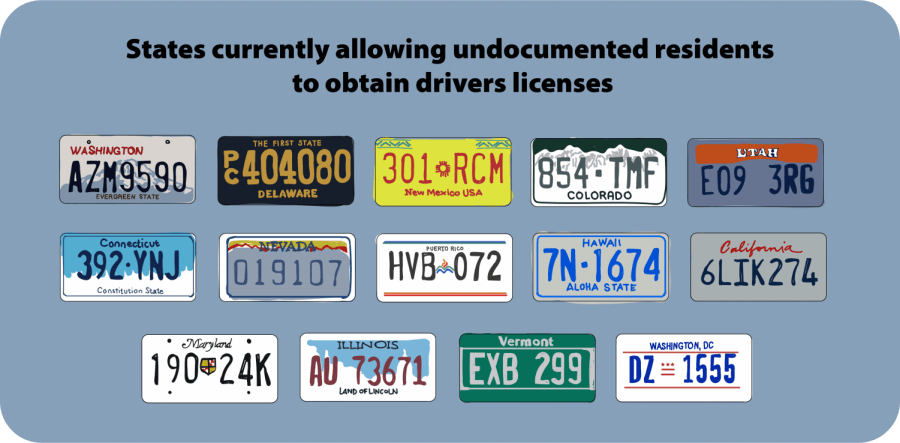States chart own path on protecting immigrants
While President Trump has made a hard-line immigration stance a central focus of his presidency — from threatening to shut the U.S. border with Mexico, to cutting aid to Central American countries to his 2016 campaign comments that Mexican immigrants are “bringing drugs, bringing crime” into the country — on the state level, it’s a more uneven picture.
While some states like Alabama enacted tough immigration measures long before Trump came into office, others states like Minnesota, Florida and Illinois have ignored the rhetoric in Washington in favor of bills that enshrine the rights of undocumented immigrants.
Some of the recent legislation has focused on the issue of giving state driver’s licenses to such individuals.
Section 12 of Alabama House Bill 56, which was signed back in 2011, states that an officer of the law can check the immigration status of a person if they have “reasonable suspicion” that a person is “an alien or unlawfully present” during an arrest, detention or lawful stop.
The Southern Poverty Law Center and other advocacy groups sued Alabama in federal court over the bill, seeking to have it blocked in 2013. Certain provisions still apply, including Section 12, but officers are no longer to arrest someone if it’s only to check their status.
A section of the bill also bans undocumented students from enrolling in public colleges.
Before 2005, each state was allowed to choose who was eligible for a driver’s license; many states did not ask applicants for proof of legal residency. But that changed when Congress passed the REAL ID act of 2005.
The REAL ID act required states to check the birth certificate and social security numbers of their residents before issuing them a driver’s license.
That hasn’t stopped individual states from passing laws that give undocumented residents licenses. In 1993, before the REAL ID act, Washington’s HB 1444 allowed the state’s DMV to use tax identification numbers or utility bills — rather than a social security number — to prove residency, regardless of immigration status. Eleven other states and Washington, D.C. have passed similar laws, 10 of them in the past decade.
Minnesota could be the next state to provide driver’s licenses to immigrant residents with the Driver’s License for All Bill introduced in February. The bill would allow residents to prove their residency with forms other than a social security number, such as a tax identification number.
A staff member of Minnesota House Majority Leader Ryan Winkler, a Democrat and the lead sponsor of the bill, told The DePaulia it passed in the House because “there is a consensus amongst the majority party that immigrants are important to the state of Minnesota and its growth.”
“Life is very difficult without a driver’s license,” the staff member said, citing impediments to getting viable insurance, traveling to and from work and being able to financially support one’s family.
Florida legislators also tried to pass legislation that could give all of their residents access to a driver’s license. The corresponding House and Senate bills both died in committee earlier this month.
Opponents of letting undocumented residents have a license, such as New York Republican Sen. Daphne Jordan, say that it could allow for voter fraud, ID fraud and bank fraud.
But states that do give undocumented residents a license, temporary or permanent, require that the licenses all have distinguishing features such as the words “Not for Identification” or “Federal Limits Apply,” and they are not allowed to be used for voting.
Other opponents say they should not get a license because they are not here legally.
A 2016 Stanford University study examining California bill AB 60, which provides licenses to undocumented immigrants and helps them get insurance coverage, found that the rate of hit-and-run accidents decreased a year after the bill was implemented.
The authors suggested a possible reason for the decline was that undocumented individuals had less reason to flee the scene, as they did not have to fear deportation. The authors estimated that “not-at-fault drivers avoided out of pocket expenses for car repairs (physical damage) of about $3.5 million.”
Illinois has allowed people to receive temporary licenses without social security numbers since 2013, and now the state is pushing for rights for undocumented residents in other ways.
Of concern to some legislators and advocacy groups are government-funded privatized detention centers used to hold immigrants. Critics say these facilities often do not have adequate resources to care for children and families, and there have been thousands of allegations of abuse levied against many of them.
Illinois HB 2040, introduced by Rep. Kelly Cassidy, D-Chicago, in February, seeks to ban the use of such facilities in the state.
“Detention centers should not be funded by a private corporation — they’re going to do the bare minimum to keep it running and not care about the people housed inside,” said DePaul senior Luis Roman, who is a member of the Latinx fraternity Lambda Theta Phi.
Luisa Sosa, of the Illinois Coalition of Immigrant and Refugee Rights, which advocated for the bill, said it is imperative for her group to make changes and pass legislation that protects the communities.”
“The current administration continues to throw attacks at our immigrant and refugee communities,” she said.
HB 2040 passed in the Senate on Thursday, May 16, and now moves to the desk of Gov. J.B. Pritzker.
Despite the anti-immigration rhetoric in D.C., Sosa said communities are more engaged than ever at the local level.
“[Communities] feel moved by the family separation at the border and deportation [that are] happening every day,” she said.








Debbie Lee Rawls • May 21, 2019 at 10:24 am
I say cut government funds to these states, or remove these anti-Americans getting paid by American citizens. And its a form of harboring illegal aliens and thats breaking our laws. It seems our laws don’t apply to government paid employees. We Americans should push for their removal and jailed.